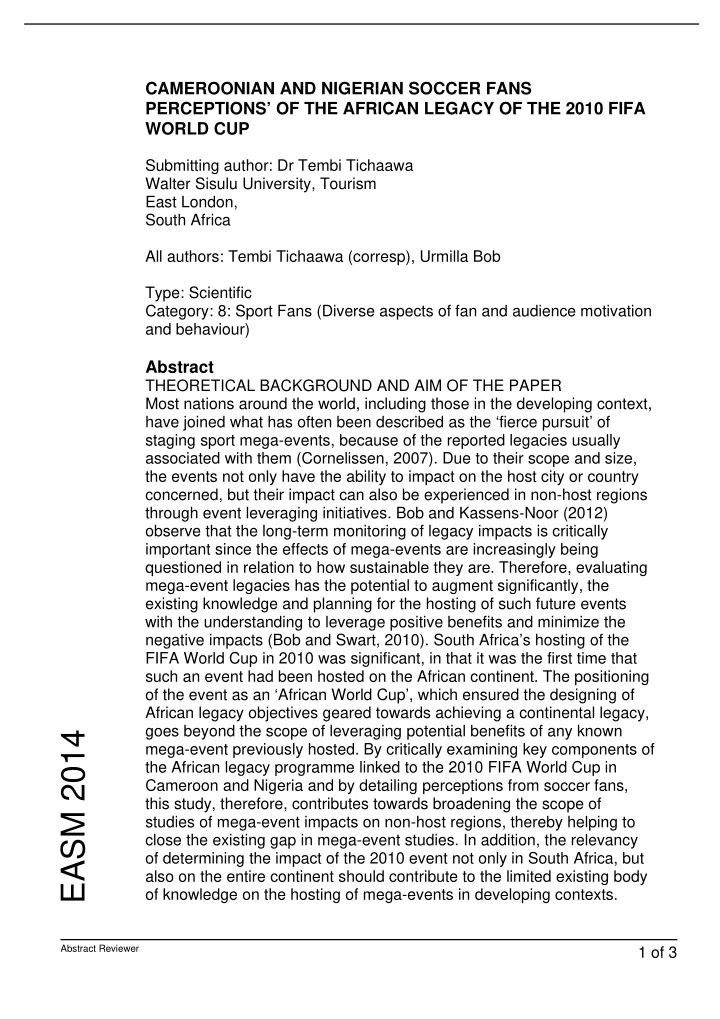

CAMEROONIAN AND NIGERIAN SOCCER FANS PERCEPTIONS’ OF THE AFRICAN LEGACY OF THE 2010 FIFA WORLD CUP Submitting author: Dr Tembi Tichaawa Walter Sisulu University, Tourism East London, South Africa All authors: Tembi Tichaawa (corresp), Urmilla Bob Type: Scientific Category: 8: Sport Fans (Diverse aspects of fan and audience motivation and behaviour) Abstract THEORETICAL BACKGROUND AND AIM OF THE PAPER� Most nations around the world, including those in the developing context, have joined what has often been described as the ‘fierce pursuit’ of staging sport mega-events, because of the reported legacies usually associated with them (Cornelissen, 2007). Due to their scope and size, the events not only have the ability to impact on the host city or country concerned, but their impact can also be experienced in non-host regions through event leveraging initiatives. Bob and Kassens-Noor (2012) observe that the long-term monitoring of legacy impacts is critically important since the effects of mega-events are increasingly being questioned in relation to how sustainable they are. Therefore, evaluating mega-event legacies has the potential to augment significantly, the existing knowledge and planning for the hosting of such future events with the understanding to leverage positive benefits and minimize the negative impacts (Bob and Swart, 2010). South Africa’s hosting of the FIFA World Cup in 2010 was significant, in that it was the first time that such an event had been hosted on the African continent. The positioning of the event as an ‘African World Cup’, which ensured the designing of African legacy objectives geared towards achieving a continental legacy, goes beyond the scope of leveraging potential benefits of any known EASM 2014 mega-event previously hosted. By critically examining key components of the African legacy programme linked to the 2010 FIFA World Cup in Cameroon and Nigeria and by detailing perceptions from soccer fans, this study, therefore, contributes towards broadening the scope of studies of mega-event impacts on non-host regions, thereby helping to close the existing gap in mega-event studies. In addition, the relevancy of determining the impact of the 2010 event not only in South Africa, but also on the entire continent should contribute to the limited existing body of knowledge on the hosting of mega-events in developing contexts.� Abstract Reviewer 1 of 3
� METHODOLOGY, RESEARCH DESIGN AND DATA ANALYSIS� A mixed method research design (qualitative and quantitative) was adopted for the study. In both Cameroon and Nigeria, soccer fans were interviewed on a face-to-face basis using a semi-structured questionnaire. The sample size was decided upon based on a table that was devised for determining how large a randomly chosen sample from a given finite population of n cases should be, such that the sample proportion p would fall within .05 of the population proportion, meaning p with a 95% level of confidence (Isaac and Micheal, 1981). A typical football match in Cameroon and Nigeria can attract an average of 30 000 repeat fans. Accordingly, a total of 758 questionnaires was equally split (379 each) and administered to soccer fans in both case study areas. Such fans were chosen at specific popular stadiums (the Unification Stadium in Limbe, Cameroon, and the U.J. Esuene Stadium in Calabar, Nigeria) that had been noted as hosting international football matches on a specific game day. On each game day in question, specially trained fieldworkers were located throughout the stadium’s entry points in order to be able to apply the systematic stratified sampling method, according to which every 79th fan was chosen in order to ensure a more representative sample of the population surveyed. The Statistical Package for the Social Sciences (SPSS) software was used to analyse the data.� � RESULTS DISCUSSION AND IMPLICATIONS� The findings reveal the fan profile to be mainly educated young males who either work on a full-time basis, study, unemployed or are self- employed. They have largely never attended a FIFA World Cup including the 2010 FIFA World Cup, but displayed a very strong support for South Africa hosting it mainly because of Africanism. Their level of awareness of the African legacy intentions/objectives and understanding of mega- event legacies is quite low. Furthermore, fans in both countries were largely skeptical about the event having improved the socio- environmental and political condition of Africa’s citizens although perceptions of legacies in relation to job creation, skills development, image enhancement, infrastructural development mainly linked to sport facilities, and improvement of football in Africa were largely positive. However, they also perceive that corruption and lack of financial support EASM 2014 are the main challenges facing the sustainability of the African legacy projects. The key findings from the study are seen to have a wider applicability to mega-event legacy, especially in the context of Africa and the rest of the developing world. The results raises new critical questions related to mega-event legacies and inform the rethinking of theoretical constructs and contribute to the re-conceptualisation of legacy impacts in relation to mega-events. References Abstract Reviewer 2 of 3
Bob, U., and Swart, K. (2010). Sport events and social legacies. Alternation, 17(2):72-95.� � Bob, U., and Kassens-Noor, E. (2012). An indicator framework to assess the legacy impacts of the 2010 FIFA World Cup. African Journal for Physical, Health Education, Recreation and Dance, (1): 12-21.� � Cornelissen, S. (2007). Crafting legacies: the changing political economy of global sport and the 2010 FIFA World Cup. Politikon, 34(3):241-259.� � Isaac, S., and Michael, W.B. (1981). Handbook in research and evaluation. San Diego: Edits Publishers. EASM 2014 Abstract Reviewer 3 of 3
Recommend
More recommend